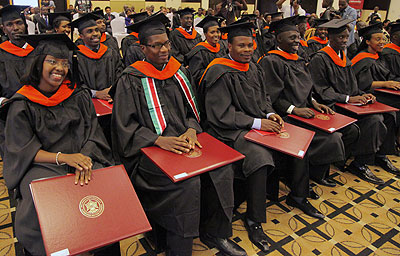Twenty-two students were awarded master’s degrees in information technology (IT) during Carnegie Mellon University (CMU) Rwanda’s maiden graduation ceremony yesterday. The graduates of Carnegie Mellon University listen to speeches yesterday


Twenty-two students were awarded master’s degrees in information technology (IT) during Carnegie Mellon University (CMU) Rwanda’s maiden graduation ceremony yesterday.
Addressing the graduates at Serena Kigali Hotel, James H. Garret Jr., the Dean, College of Engineering at the university, said Rwanda has an opportunity to play an important role in the region.
"As a future-focused university, we want to have a presence in places that have the potential to have a big impact on the future,” said Garret.
"I’m excited about the future of East Africa and our role in educating the next generation of African leaders, those of you sitting right here in front of me.”
This was the first graduating class since the school opened its doors in Rwanda in 2012.
Merab Twahirwa spoke on behalf of the graduating class and thanked the university as well as Government of Rwanda for helping them on their way to achieving their goals. "Thank you for dreaming so big and giving us the greatest opportunity of quality education.”
She added: "This education has opened up our minds and empowered us to think about our roles in changing ourselves, our families, our country and the world.”
Twahirwa also praised her professors for having high expectations in all of the students and pushing them to achieve their best. "For some of you, it was your first trip to Africa, and as you learned about our country and culture you did not let us settle for anything less than would be expected of the students at the main campus.”
Twahirwa turned down a scholarship to the London School of Commerce to attend Carnegie Mellon-Rwanda and pursue her passion in computer sciences.
She completed an internship with IBM in Nairobi during her studies and now has a job at Pivot Access, a software company in Kigali.
To ensure that Carnegie Mellon University’s research and curriculum in Rwanda remain relevant to Africa, the faculty and students engage with local companies and multinational corporations on a continual basis, according to the university.
"Being present in East Africa is the only way to understand the region’s technology needs,” says Bruce Krogh, the inaugural director of CMU in East Africa.
"Creating a long-term education programme is critical, because it gives students time to analyse problems and develop solutions in the context in which they occur.”
"It is important that students stay in East Africa instead of studying in the States or elsewhere. If Africa’s best students leave to study abroad for two years, that becomes problematic. At CMU, students remain plugged into the region’s rapidly evolving technical and business networks,” Krogh added in a statement.
The graduation underscores Carnegie Mellon University and the Government of Rwanda’s commitment to educating engineers and entrepreneurs who are striving to make an economic impact in East Africa.
Many of the students have ambitions to be the next technical innovators and business leaders responsible for ushering the region’s economic and social growth into the future.


